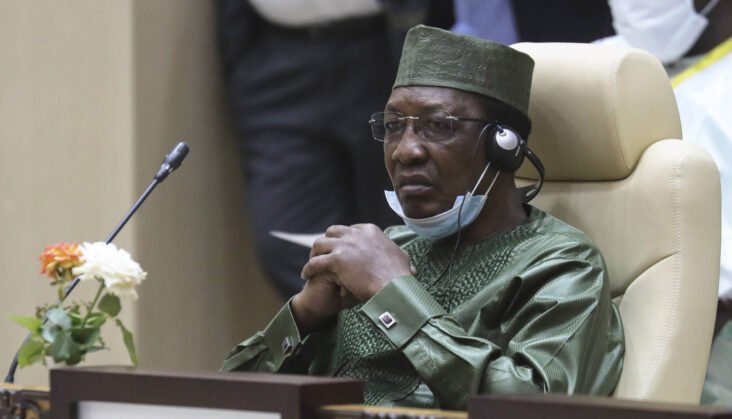
Chad’s President Idriss Deby Killed In Battle
Chad’s President Idriss Deby has died while visiting troops on the front line of a fight against northern rebels, the army said on Tuesday, and the day after Deby was declared the winner of a presidential election.
Deby’s son, Mahamat Kaka, was named interim president by a transitional council of military officers, spokesperson Azem Bermendao Agouna said in a broadcast on state television.
Deby, 68, came to power in a rebellion in 1990 and was one of Africa’s longest-ruling leaders. He and his army have been seen as a reliable Western ally in a turbulent region contending with jihadists.
His campaign said on Monday he was joining troops on the front line after rebels based across the northern frontier near Libya advanced hundreds of kilometres south toward Chad’s capital, N’Djamena.
The exact cause of death was not yet clear, but a European diplomatic source said Deby had been killed.
“A call to dialogue and peace is launched to all Chadians in the country and abroad in order to continue to build Chad together,” Bermendao said, surrounded by several officers.
“The National Council of Transition reassures the Chadian people that all measures have been taken to guarantee peace, security and the republican order,” he said.
Violence in the Sahel
Deby, whose opponents accused him of repressive rule, pushed through a new constitution in 2018 that would have allowed him to stay in power until 2033 — even as it reinstated term limits.
He took the title of “Marshal” last year and said before last week’s election, “I know in advance that I will win, as I have done for the last 30 years.”
Deby was dealing with mounting public discontent over his management of Chad’s oil wealth and crackdowns on opponents.
French President Emmanuel Macron, seen with Deby in Pau, France, on Jan. 13, has spearheaded an international military and peacekeeping effort in the Sahel to try to maintain stability in the region. (Regis Duvignau/Reuters)
But in the election results announced on Monday, Deby was credited with 79 per cent of the vote, handing him a sixth term in office. Several leading opposition figures boycotted the poll.
Deby’s death is a blow to France, which had based its Sahel counterterrorism operations in N’Djamena. Chad had announced in February the deployment of 1,200 troops to complement 5,100 French soldiers in the area.
France, the former colonial power, took note of the creation of an interim military body, urging a quick return to civilian rule and a peaceful transition.
“France lost a brave friend,” President Emmanuel Macron’s office said in a statement. “It expresses its strong attachment to Chad’s stability and territorial integrity.”
Western countries have seen Deby as an ally in the fight against Islamist extremist groups, including Boko Haram in the Lake Chad Basin and groups linked to al-Qaeda and Islamic State in the Sahel.
Canada has been among the Western nations concerned about the violence and instability in the Sahel region, sending peacekeeping troops to Mali in 2018-19. Canada also contributed more than $280 million in developmental assistance to the so-called G5 Sahel, which comprises Burkina Faso, Chad, Mali, Mauritania and Niger.
The latest development will likely cause more alarm in Paris and Washington.
“Deby had his hand in many things in the Sahel. His death disrupt things,” a senior regional diplomat told Reuters.
Recent election not seen as free and fair by critics
Deby had joined the army in the 1970s when Chad was going through a long-running civil war. He received military training in France and returned to Chad in 1978, throwing his support behind the president at the time, Hissène Habré, and eventually becoming commander in chief of the armed forces.
He seized power in 1990, leading a rebel army swathed in desert headgear in a three-week offensive launched from neighbouring Sudan to topple Habré, a man accused of instigating tens of thousands of political murders.
Over time, Deby himself would be viewed by critics as an autocrat.
Succès Masra, a 38-year old opposition firebrand whose candidacy was rejected because he did not meet the minimum age of 45, said the recent election was a masquerade.
The country’s Supreme Court barred six others from contesting the election, while the runner-up in the last election in 2016, Saleh Kebzabo, and Ngarledji Yorongar, another prominent opposition leader, withdrew from the race in protest.
‘We still don’t have the whole story’
Some foreign observers questioned how a head of state could have been killed, saying it cast doubt on his protective guard. The Chadian military had only acknowledged five deaths in weekend fighting, in which it said it had killed 300 rebels.
“We still don’t have the whole story,” Laith Alkhouri, a global intelligence adviser, told The Associated Press. “It raises concerns regarding the security forces’ assessment of the clashes and their intelligence regarding the severity of the situation.”
Other analysts pointed to Deby’s long history of visiting the battlefield as a former army commander himself.
“There’s no evidence to suggest this was a coup committed by his troops. Anyone who follows Deby knows he used to say ‘to lead troops you have to smell the gunpowder,’ “tweeted Cameron Hudson with the Atlantic Council’s Africa Center.

